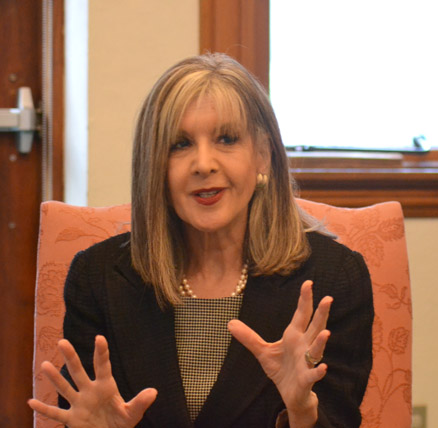
By Ann Needle
Talking about writing is about as far as some potential authors get. But at Randall Library last Thursday, two award-winning authors—including one local TV personality—offered encouraging words to a full audience on how they have gotten their novels onto paper.
As the long-time correspondent at Channel 7 News, Hank Phillippi Ryan is best known for her investigative reporting into what she termed “secrets someone didn’t want you to know.” But, it’s still a secret to some that Phillippi Ryan’s second career as a mystery writer has brought her several awards, including an Agatha (named for Agatha Christie).
Joining Phillip Ryan was novelist Tilia Klebenov Jacobs, whose “Wrong Place, Wrong Time” copped her a Beverly Hills Book Award. The mystery writer talked about first meeting Phillippi Ryan three years ago, at the New England Crime Bake, a mystery writers’ conference held in Dedham, that has as its logo “this lobster with these little handcuffs on its claws,” said Klebenov Jacobs. While already a “friend” on Phillippi Ryan’s Facebook site, Klebenov Jacobs said the Crime Bake allowed her to introduce herself to the reporter.
Phillippi Ryan described the two as “definitely on the same wavelength.” Yet, as the authors questioned each other for the audience on how each approaches the task of writing, it became clear that they take a different approach to crafting stories.
Klebenov Jacobs declared that she absolutely needs to jot down a story outline before writing; Phillippi Ryan said she just hits the page with an idea and a few thoughts. Ironically, Klebenov Jacobs chalked her first novel up to spontaneity.
The Deadline as Friend
Though her background is in teaching, Klebenov Jacobs said she became seriously interested in novel writing a few years ago, at age 43, after seeing the Burt Lancaster movie, “The Flame and the Arrow.” The plot revolved around the hero and wife, kidnapped by the local aristocrat five years earlier. “I was thinking, a lot of crimes have been committed here. What if this happened, what if that happened? If I was in this situation, I would want to get home to my husband and kids.”
Klebenov Jacobs described plunging into an annual, online event, National Novel Writing Month, soon after absorbing these observations about the world of fiction. This annual exercise challenges participants to start and finish a full novel in November. “I wrote it down very fast – and it still wouldn’t leave me alone,” she observed.
“What made you do that?” Phillippi Ryan asked. Klebenov Jacobs’ simple answer; “Hubris.” Confidence aside, Klebenov Jacobs praised the National Novel Writing Month for its ability to force creativity out in a very short time. “You give yourself permission to write garbage. You clean it up later.” She added, “The deadline is your friend. How many of us accomplish anything without a deadline?”
Phillippi Ryan agreed, noting, “NaNoWriMo is letting your brain open and letting your mind work, without the pressure to be wonderful.”
While Klebenov Jacobs has since adopted the outline approach to starting a story, Phillippi Ryan said her news training has conditioned her to be comfortable with starting a story and not knowing how it will play out. “Everything is a surprise,” Phillippi Ryan remarked about her plot turns. “Sometime I don’t know who the bad guy will be.” She recalled writing a scene where a character said, “Jane, I don’t know where Polly is.” Phillippi Ryan’s first thought was, “Neither do I.”
After eight novels in 10 years, the 65-year-old Phillippi Ryan said there were times when the thoughts have come so fast, the spell checker on her computer couldn’t keep up. But, “There are times when I think, even after 40 years in the news business, I’ll never have another story, I’ll never have another great idea.”
But ideas can pop up anywhere. Phillippi Ryan described pulling the plot for “The Other Woman” novel from her dentist’s waiting room, flipping through a copy of People magazine, which had a piece on Mark Sanford, the South Carolina governor who, among other questionable activities, went missing for days while cheating on his wife. “It made me wonder, why would anyone choose to be ‘the other woman’?” she said.
Though the Sanford story is an old one, Klebenov Jacobs agreed that there are some eternal plots that readers crave, “And you put your own stamp, your own passion, on it.”
Strolling through the library with her husband one day, Klebenov Jacobs recalled how he combed through the Harlequin Romance section, concluding that 75% involved a kidnapping, a la Wrong Place, Wrong Time. However, she stressed, “I’m about taking those romantic conventions and skirting them.”
Phillippi Ryan commented, “Once, someone said there are only two plots in the universe; someone goes on a journey, or a stranger comes to town.”
But with mystery writing, Phillippi Ryan insisted there are higher priorities than where the plot came from. “I would like to think that someone reading ‘The Wrong Girl’ on a plane, when they get to their destination, they think, just one more chapter,” she said.